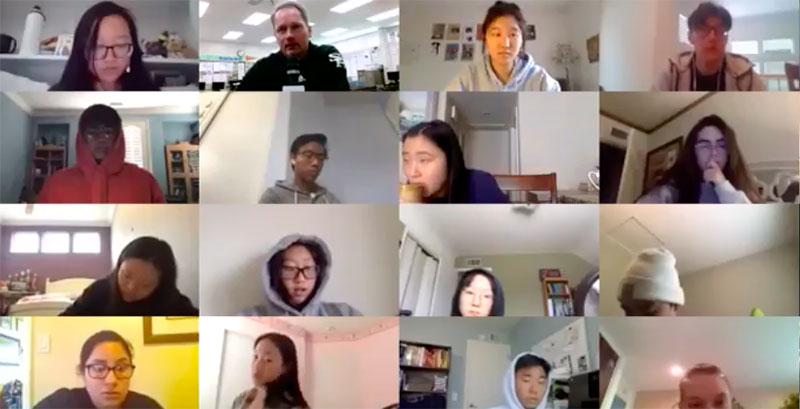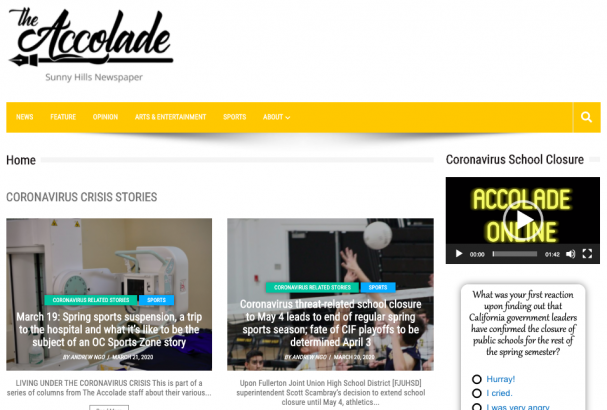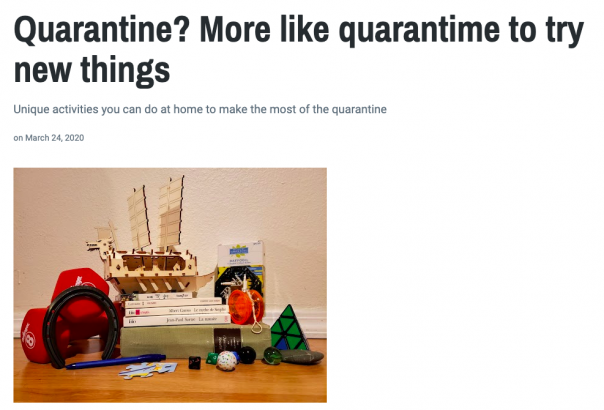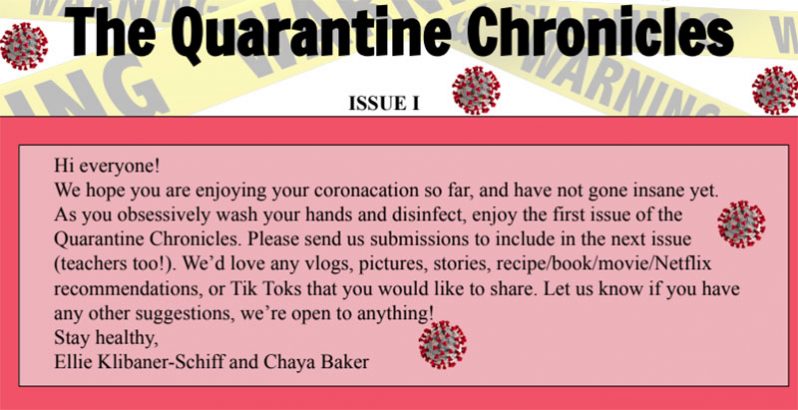Going All In on the Biggest Story of Their Lives, Student Journalists Covering the Coronavirus Haven’t Missed a Beat

When the coronavirus pandemic shuttered campuses nationwide last month, student life at Sunny Hills High School was thrown into disarray. Student sports were canceled at the suburban Los Angeles campus, and seniors worried that they’d miss their once-in-a-lifetime chance to walk across the graduation stage.
What didn’t come to a screeching halt, however, was the school’s steadfast student newspaper, The Accolade. Working from home and collaborating through the instant-messaging platform Slack, student staffers rushed to serve the campus community with regular updates about the school’s closure and transition to online learning, free meals for low-income students and a column about why the cancellation of Pilipino Culture Night “hurts like the loss of a family member.”
“Journalism, especially right now, is more important than ever because we’re the ones updating people about what’s going on,” said Michelle Buckley, The Accolade’s editor in chief. “I think a lot of our readers are very appreciative of our efforts and [for] getting them the latest information.”

Student reporters across the country have adopted a similar mentality. Even in communities where students have taken a hiatus from classes, budding Ernie Pyles have gone all in to cover the biggest story of their lives.
At DuPont Manual High School in Louisville, Kentucky, students typically publish an issue of the newsmagazine On the Record once a semester. But even before the district closed its campuses March 16, the staff pivoted to provide readers with daily online updates about the virus. One story delved into the importance of community service during the pandemic, while a column called on grocery store “stockpilers” to stop hoarding goods like food and toilet paper and to leave some “for those who really need them.” Even though classes were canceled, the newsmagazine staff felt compelled to keep plugging away, said Katie Cummins, a 17-year-old junior and assistant copy editor at the magazine.
“All of the coverage is just students being proactive,” she said. “A lot of us recognize the importance of what we do, and I think a lot of us recognize how our perspective is really unique and how it’s not really being covered. The stories that we’re covering aren’t necessarily being talked about.”
As Sunny Hills students heard chatter about a potential school closure, the newspaper staff met to consider their options. Although they halted the print publication, they agreed it was important to keep their website afloat, said Buckley, an 18-year-old senior.
About 20 minutes after administrators announced that Sunny Hills would close, Tommy Li, the newspaper’s adviser, sent students a note of encouragement, reminding them that as student journalists they are “historians of record.”
“Despite some despondency over canceled events and traditions, the future will thank you for the work you do,” Li wrote to the students through Slack. “Your health and safety comes first. Then your family. After that, I hope you’ll remember JOURNALISM.”
Their work has paid off. Alex Park, the newspaper’s web editor in chief, said their coronavirus coverage has driven an unprecedented surge in online traffic.
“When the views start increasing like that, you feel more sense of responsibility and you start to feel a stronger sense of pride,” said Park, an 18-year-old senior. “It motivates me to work harder and improve our website even more.”
Elevating youth voice
The virus has also motivated student journalists to step up their game at Beaverton High School in Oregon. The student newspaper, the Beaverton Hummer, has followed the news closely. One article, titled “Stop, drop and stay home,” addressed the importance of social-distancing and “flattening the curve.” Another offered advice on how students can make the most of online learning.
Because district announcements are sent to parents, the newspaper has become an important outlet for students, said Anouk Clendenning, a 14-year-old sophomore and editor at the paper. But as school officials create plans on short notice, students have been frustrated by a lack of transparency about plans for events like prom and graduation, she said.
“The district will send out newsletters, but usually it’s to the parents and the staff,” she said. “I think part of the disconnect is that nobody really knows what’s going on, but it is frustrating for us to have to be the ones who are getting out all of this information that should be easily accessible.”
While the newspaper helps fill the information gap between educators and students, she said, stories in the Hummer could benefit school officials because young people offer a unique perspective.
“We have been thinking about writing an open letter to the district and publishing it on our website, about how we’d like to be included in possible solutions to the problems that they’ve been running into,” she said.

Meanwhile, for the teens themselves, sharing their own perspectives helps them to understand an event that could shape the rest of their lives, said Cummins of Louisville.
“We’ve never seen the world hold its breath like this,” Cummins said, adding that most of her peers weren’t alive for the terrorist attacks on Sept. 11, 2001. “We’ve never seen the global community come together in such a big way before.”
‘The Quarantine Chronicles’
While some student journalists have seized on the coronavirus news cycle, Ellie Klibaner-Schiff didn’t want to dwell on the doom and gloom.
Instead, the 17-year-old junior at the Maimonides School in suburban Boston created The Quarantine Chronicles. Despite its virus-themed namesake, Klibaner-Schiff said she didn’t want the publication to add to the “information overload” about the virus. So she created the Chronicles to offer students a distraction at a time when “everyone is so bombarded by coronavirus, coronavirus, coronavirus, always.”

The digital publication, emailed weekly to students at her school, is whimsical. The first edition offered book recommendations — including “Pride and Prejudice” by Jane Austen and the Holy Bible — and a top-10 list of television shows to watch alone. But Klibaner-Schiff’s favorite article offers a brief history of “pandemic fashion,” which included a picture of women wearing scarves during the 1918 Spanish Flu.
“That was really cool because it was like ‘We can make light of the situation while at the same time appreciating its importance,’” she said.
The staff of the Beaverton Hummer has also recognized a need to offer readers stories that veer from the pandemic. In fact, the staff is “trying to move away from constant coronavirus coverage,” Clendenning said.
“No one really wants to experience” bad news all day, so the paper is “trying to write more lighthearted articles for people to just enjoy,” said Melody Cosgrove, a 16-year-old sophomore who writes and edits for the paper. One story tries to settle an “age-old question”: What is the best superpower? (Answer: “The ability to mute others.”) Another article makes the case for eating bugs.
Klibaner-Schiff said The Quarantine Chronicles has been well received by members of the school community, and several people have reached out with ideas for upcoming issues. Although students are isolated at home, she said the Chronicles has offered a sense of community during a time of uncertainty.
“We’re acknowledging that we’re in this different place. We’re acknowledging ‘Yeah, life is hard right now, life is really stressful,’” she said. “But at the same time, we’re really all in this together. Here are some things you can do to get a little normal back — to maybe laugh again.”
Get stories like these delivered straight to your inbox. Sign up for The 74 Newsletter

;)
